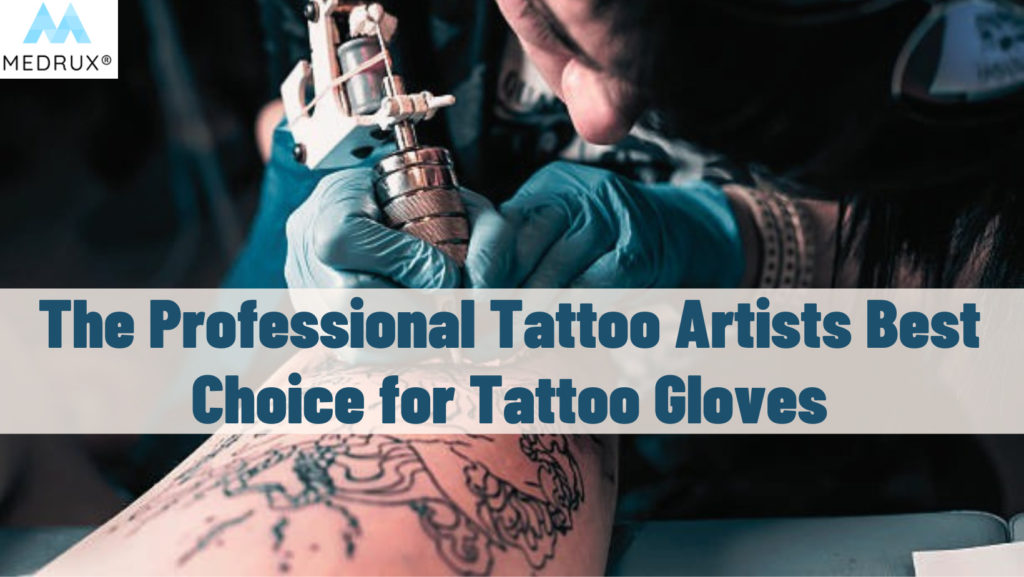What’s the standard practice between a healthcare professional in a hospital and a tattoo artist?
You are correct if your answer is skin penetration using a needle!
Although tattooing is a form of luxury and not a necessity, it is essential to practice it with caution and seriousness,
Because it can quickly go wrong if tattoo artists don’t follow proper sterilization and cleanliness techniques, a new tattoo is very similar to an open wound as it is prone to infection.
Therefore, keeping the tattoo shop free of contamination is very important. This is the reason why tattoo artists must always use tattoo gloves.
And it might be far less important than the point mentioned earlier, but also, tattoo gloves with specific colors give a professional outlook to the tattoo artist.
In this article, we are going to talk about tattoo gloves: why exactly you need them, what the types are, what to look for when shopping for one, and what is the best option amongst all of them.
Let’s start with the following:
Why exactly do you need tattoo gloves as a tattoo artist?
-
Health and well-being
As we mentioned earlier, a tattoo is basically like an open wound. And open wounds are defenseless against blood-transmitted diseases.
Some of these diseases are:
- HIV
- Hepatitis B
- Hepatitis C
These are only some dangerous diseases that could easily be prevented by following the proper health guidelines and aseptic techniques.
Also, an infected tattoo can take an extremely long time to heal. Since tattoo artists have to touch the skin while making the tattoo, skin-to-skin contact with an open wound is a health hazard.
That’s where tattoo gloves come in handy to assure protection for both the tattoo artist and the client from cross-contamination or infection.
-
Legal responsibility
Due to the safety concerns surrounding tattooing and transmitting diseases or infections, Occupational Safety and Health Administration (OSHA)(1) and the Center for Disease Control (CDC)(2) set rules for both tattoo shops and tattoo artists.
Not following these rules can put tattoo shops and artists through severe legal liabilities.
Customers can use any tattoo place that does not follow these rules and regulations.
Amongst these rules, tattoo gloves are essential for preventative safety role.
-
Protection from physical injuries
Tattoo artists use sharp tools and needles to penetrate the skin.
While doing so can injure themselves easily if the skin is unprotected and exposed.
Artists also use chemicals and dyes in the tattooing process, and if the skin is exposed, the artist might get some of these harsh chemicals on their skin.
This article will mention some tattoo gloves that are especially tough and can easily prevent these injuries.
So, now that we established why tattoo artists must use tattoo gloves.
What are the different types of tattoo gloves?
There are mainly three types of tattoo gloves popularly used by tattoo artists; we will discuss each. And we will mention the pros and cons of each one of them.
-
Latex gloves
Latex gloves are made from a natural material extracted from the rubber tree, mainly found in Malaysia, India, Indonesia, Vietnam, and Thailand. Manufacturers first used it in the late 1800s.
I am making it the oldest and most commonly used type of disposable glove. There are mainly two types of Latex gloves, powdered and unpowdered.
-
Powdered Latex gloves:
The powder is usually added inside the Latex gloves to make it easier for the user to wear and take off.
The powder also makes it easier for the user to wear it for a long time because it absorbs sweat. However, researchers found that these gloves’ primary source of airborne allergy is the powder itself.
-
Un powdered Latex gloves
As mentioned earlier, the airborne allergy caused by the powder is why manufacturers had to make un powdered Latex gloves to accommodate different customers with different needs.
So, what are the pros and cons of Latex gloves?
Why are latex gloves the right choice as tattoo gloves?
Latex gloves protect against bacteria, viruses, and fungi, protecting against contamination and disease transmission.
Additionally, they are flexible, the most elastic type of gloves. They offer high agility, which tattoo artists need the most in their gloves to be efficient and not make their work more difficult.
Quality tattoo artists must have gloves and use sharp needles to make tattoos. Also, Latex gloves are tear-resistant. They are also durable and offer acid resistance which is also very important in this profession.
Last but not least, Latex gloves are echo-friendly. Because Latex comes from a natural source, it is biodegradable.
So you can use Latex gloves to ensure your safety while being environmentally aware. And although Latex gloves have many great qualities, they are also relatively inexpensive.
Why may Latex gloves not be the best option for you?
Latex allergy is an issue separate from the airborne powder allergy in powdered Latex gloves. In this case, Latex itself is the cause of this allergic reaction.
Latex allergy can vary from minor to moderate local rashes and skin irritation in the site of exposure to Latex which is mainly that of hands, to anaphylactic shock in some cases.
Now we have to be aware that it poses a danger to tattoo artists who are allergic to Latex and clients who may not even be aware that they have a Latex allergy.
Also, Latex gloves are relatively thin. That’s why only a few tattoo artists use Latex as their tattoo gloves.
-
Vinyl gloves
Vinyl gloves are made from polyvinyl chloride (PVC). That’s why they are usually called PVC gloves.
Unlike Latex, PVC is a synthetic material. It’s a petroleum-based polymer that goes through chemical processes to be made.
Although PVC usually has a more rigid form like the one used in plastic bottles, scientists developed a more flexible form by adding plasticizers. That’s the form we use now in PVC gloves, one of which is tattoo gloves.
Why use vinyl gloves?
Vinyl gloves are much thicker and more resistant to exposure than Latex gloves, offering more reliable protection.
Also, unlike Latex gloves, Vinyl gloves do not cause allergic reactions or rashes on the skin.
Vinyl gloves also resist acids, bases, grease, and oil.
Also, Vinyl gloves can withstand heat up to 93 degree Celsius, which is more than Latex, which can withstand only up to 82 degrees Celsius.
Why do vinyl gloves not make the best tattoo gloves?
Well, these types of gloves are pretty problematic for tattoo artists to use as tattoo gloves, and here is why:
Vinyl gloves offer much lower elasticity and flexibility than Latex gloves. Unlike Latex gloves that can fit on your hand like your own skin, Vinyl gloves are more rigid even after treatment with plasticizers.
Moreover, that is a big issue for tattoo artists because most tattoos, if not all, require fine hand movements.
It’s an art; like any other, it requires sensitivity and precision with hand movement. That’s why flexible tattoo gloves are a must for every tattoo artist.
Not only that, but even though Vinyl gloves are more rigid, they offer less mechanical strength than Latex gloves.
And that’s because Vinyl molecules have low molecular cohesion.
Meaning the particles do not stick together nicely when the glove is stretched.
And that’s not the only problem that low molecular cohesion causes.
How about the protection?
Due to the particle’s partial separation, PVC gloves offer poor protection against microorganisms.
As the material stretches, the gloves no longer protect the tattoo artist and the client from cross-contamination and disease transmission due to the high permeability of the material.
However, scientists recently solved this problem by creating antimicrobial vinyl gloves.
Not only that but also PVC gloves are less durable; they can easily tear and break, which makes them useless against sharp tools and needles used by tattoo artists.
Also, unlike latex gloves, Vinyl gloves are not echo-friendly. Which poses a huge moral dilemma when it comes to our environmental responsibility.
Not only are PVC gloves not biodegradable, but they also release chlorinated toxins into our environment.
Contamination by chlorinated toxins released by vinyl gloves affects the environment in all stages; if these gloves are used in food, it Contaminates food.
Bottomline:
Regarding vinyl gloves used as tattoo gloves, tattoo artists use this type only when they move chemicals around or sanitize the workplace.
Here is your detailed guide to choosing between Latex and vinyl gloves based on your specific needs
-
Nitrile gloves
Stretchy, comfortable, and durable.
Nitrile gloves are made of synthetic polymers; it contains molecular chains that are firmly connected, unlike PVS. Hence providing better durability than Vinyl gloves.
Nitrile offers an excellent alternative to Latex gloves, as it is also stretchable and durable like Latex.
But in the beginning, nitrile gloves were expensive. Now that the technology is better, nitrile gloves are much more affordable.
Nitrile gloves come in many different colors, but the most commonly used by tattoo artists are the black nitrile gloves because the color black conceals the dyes and the pigments used in tattooing.
And we can not deny that black tattoo gloves give tattoo artists an extraordinary professional outlook!
So,
Why use nitrile tattoo gloves?
As we mentioned earlier, nitrile gloves are made of synthetic material, and there is no Latex in the process of making nitrile. Therefore there is no concern about allergic reactions like the ones we see in Latex gloves.
Also, nitrile gloves are water-resistant to a certain extent. And they offer protection against oils, grease, acids, and other harmful chemicals.
Not only that, but they also offer protection against microorganisms and sharp objects.
They are also tear-resistant even with constant stressful use while wielding heavy machines, perfect for use as tattoo gloves!
Moreover, if you keep nitrile gloves stored in a cool and dry place, they can stay intact for a long time.
Some types of black nitrile tattoo gloves are also sweated absorbent, which provides more comfort to the tattoo artist that usually has to wear these gloves for an extended period.
Nitrile gloves are excessively torn and puncture-resistant; they are considered the most resistant among all glove materials.
They are not as thick and rigid as vinyl gloves but resilient and resistant to breakage. Doesn’t that mean that these gloves offer the best of both worlds?
Nitrile gloves are highly anti-friction, which helps the user to wear them and take them off easily without breaking or tearing.
They are also sensitive to tools and fine movements and offer agility and flexibility of hand movements, whichever you need in your tattoo gloves.
And last but not least, good news to every environmentally aware individual, nitrile gloves are recyclable!
You can pack them and ship them to recycling centers. But even if that is not available, disposable nitrile gloves will eventually disintegrate.
However, they may take a relatively long time to disintegrate than Latex gloves fully.
What are the cons of using nitrile tattoo gloves?
Well, we tried to find the downside of nitrile gloves as tattoo gloves, and here is what we found.
Nitrile gloves are not readily biodegradable.
As we mentioned earlier, they take a relatively long time to disintegrate. That’s why we advise proper recycling.
Also, the microorganisms that might exist on the surface of these gloves may contaminate the environment if we do not dispose of them correctly.
That’s why we advise you that each time you take them off, you must follow the proper removal and disposal protocol for your safety and the well-being of the environment.
Bottomline:
If you follow the proper protocol of disposal and recycling, nitrile gloves are the best option for you.
It is inexpensive, easy to use, has fewer allergic reactions than Latex, and is sensitive to machines. These gloves make the perfect tattoo gloves!
Now that we know everything about different types of tattoo gloves, what criteria do we need when searching for the perfect gloves tailored to the needs of tattoo artists?
Tattoo gloves, what to look for, and what to avoid?
Tattooing is a form of art that requires fine and steady hand movements; it takes artists a long time to create one tattoo.
Time consumption varies between extensive or detailed tattoos and smaller or less complicated ones.
As we mentioned earlier, the process involves puncturing the skin, so sterilization and avoiding skin-to-skin contact are necessary.
Sweaty hands can make the tattoo artist feel uncomfortable.
Also, allergic reactions to tattoo artists or clients should be avoided.
Furthermore, tattoo artists use colors and chemicals in tattooing, and protection from leaking these materials into the artist’s hands is a must.
So, to sum it up, here is what you need to look for:
- New disposable gloves for each single-use
- Gloves that are sensitive to the machine and delicate hand movements
- Tattoo gloves must be thin and not rigid
- Gloves should offer high resilience and protection from puncture and breakage
- Artists should use gloves that do not carry the threat of causing allergic reactions to themselves or the customers
- Tattoo gloves should fit the artist perfectly and snugly. If the gloves do not provide beyond the wrists, it does not work.
- It’s better if tattoo gloves offer adsorption abilities to avoid sweaty hands.
Bottomline:
According to most tattoos artist, the ultimate perfect Tattoo gloves are black nitrile gloves. Stronger than Latex and more flexible than Vinyl. Professional tattoo artists swear by nitrile gloves.
Most of them reached this conclusion through many trials and years of experience.
And we believe in experts’ opinions. So we highly recommend using black nitrile tattoo gloves for all tattoo artists.
How should tattoo artists handle tattoo gloves?
Before wearing tattoo gloves, tattoo artists should follow the proper hygiene protocol the Centers for Disease Control (CDC) set.
Tattooist hands should be washed before wearing the gloves and after taking them off.
Tattoo gloves should always be disposable ones; they should never be reused.
Tattoo artists should not only wear gloves when they make tattoos but also while handling chemicals, dyes, and sharp tools.
Last, tattoo artists should not touch personal items/belongings while in a tattooing session. If this happens, the risk of cross-contamination increases.
Conclusion:
Tattooing is a process that has many layers to unfold and many steps to follow. Like everything else, following the guidelines is a sure way to achieve optimal results without complications.
And while there are many options, black nitrile tattoo gloves are the perfect choice for professional tattoo artists.
Following the proper instructions on how to use these gloves and dispose of them can guarantee overall health and safety for the individuals and the environment.
Let us know in the comments if there is anything you would like to know about. And always stay safe and healthy.
Hajar Nagdy is a microbiologist and a lecturer. Nagdy holds a Bachelor’s degree in the fields of microbiology and environmental sciences, and she is now a M.Sc. candidate in microbiology. In her free time, she can be found listening to classical music, reading interesting scientific articles, running a charity, or traveling across Europe.







